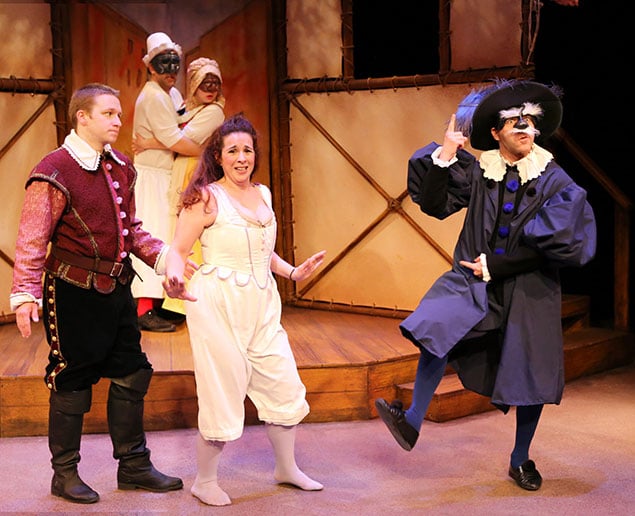
There’s not a whole lot about Faction of Fools Theatre Company’s
The Lady Becomes Him that’s new: We’ve seen the tangled romantic plotlines, vaguely familiar old world
costumes, and slapstick gender swapping mistaken identities in countless sitcoms,
movies, and Shakespearean comedies. But that’s kind of the idea. A big part of what
makes this production so likeable is its gleeful, knowing embrace of those archetypes.
And though this kind of material has all been done before, a pitch-perfect jovial
energy, impeccable comedic timing, and a fearless and talented cast make the show
far from unoriginal.
Named Outstanding Emerging Theatre Company at the 2012 Helen Hayes Awards, Faction
of Fools has made a name for itself specializing in commedia dell’arte, a particular
brand of classical theater dating back to the Renaissance that’s marked by its use
of masks, physical comedy, and all those aforementioned recognizable themes and characters.
(If we make out proverbial plotlines on modern stages and screens, they can often
be traced to commedia inspiration.)
In this case, the company, now in-residence at Gallaudet University, has created a
devised work directed by
Toby Mulford and based on a rare three-page 17th-century commedia outline that incorporates improv
and fourth-wall-bending audience interaction. Celia (Lindsey D. Snyder), an unhappy housewife, longs to run away with her young lover Orazio (Stephen Hock), but her possessive and powerful husband, Il Dottore (Matthew Pauli), keeps getting in the way. Naturally, the lovers team up with their spirited servant
sidekicks (John V. Bellomo as Pulcinella,
Jesse Terrill as Coviello, and
Rachel Spicknall Mulford as Rosetta)—who are ensnared in their own love triangles and squares and hexagons—to
outwit the romantic rivals and live happily ever after by whatever means necessary
(there’s a magical, shape-shift-inducing ring involved). Requisite hilarity ensues.
Hilarity, for once, is not an overstatement. The cast strikes an infectious comedic
chemistry in the intimate (and hard to find) space from the start. Several actors
somersault, sass, and smack their way to the top performance-wise. As the ever-hungry
Pulcinella, Bellomo tosses up sarcastic, off-the-cuff commentary like the fresh-made
pizza pies his character pines for with such passion. Snyder is solid throughout,
but really hits her stride a little later in the show as Celia’s body is overtaken
by Pulcinella,
Freaky Friday-style. Taking on Bellomo’s gruffer and more sardonic mannerisms, Snyder is funny
without falling victim to the caricature-of-playing-the-opposite-gender trap. Hock,
too, fully embodies the silliness of a self-centered, lovesick suitor but never comes
off as overdone—overdone, granted, is what they’re going for all around here, but
it’s just the right amount.
Relishing the physicality of the parts they play, Spicknall Mulford, Terrill, and
especially Pauli, are having fun on stage and it shows. Pauli, decked out in a bushy
mustachioed mask that recalls the Seussian Lorax—the show’s more clownish characters
all sport concealing facewear by mask designer
Aaron Cromie—is likely the cast’s most commanding presence. This is because of highlights like
absurdly descriptive threats (warning fellow characters he’d hollow out their appendages
and build them into a pipe organ, for instance) delivered with zeal, and a cantankerous
clumsiness that puts Pauli’s impressive professional background as a Ringling-trained
clown center stage.
An additional subplot involving an admirer of Orazio’s, Isabella (Amelia Hensley), and her own determined devotee, Luzio (James McGowan), isn’t quite as engaging as the rest of the action but the talented and funny pair
of actors, a Gallaudet student and graduate, respectively, introduce added nuance
to the layered show through their use of sign language—an appropriately expressive
addition to an already highly physical experience. The performance’s snarky closed
caption board, too, gives the clever material an extra outlet.
Like the surprisingly well-executed group musical number near the play’s conclusion,
The Lady is able to achieve its unique charm by fusing together its disparate moving parts
with the relatable glue of the crazy things we do for love. Instead of rebelling against
predictability, this production runs—and skips, and dances, and faceplants—with it.
What’s unpredictable is how well that strategy works out.
The Lady Becomes Him
is at Gallaudet University’s Eastman Studio Theatre—Elstad Annex through May 12. Running
time: approximately 90 minutes with no intermission. Tickets, $25, are available at
Faction of Fools’ website.
















